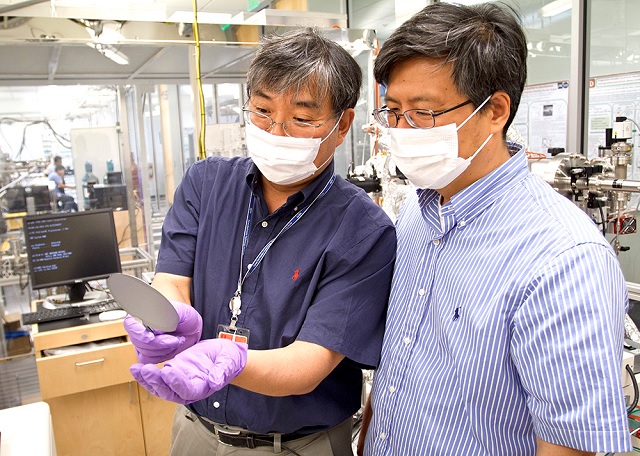 Dr. Jiyoung Kim (left) and Dr. Kyeongjae “K.J.” Cho examine a wafer used to make transistors. The two created new technology that could reduce energy consumption in mobile devices and computers.
Dr. Jiyoung Kim (left) and Dr. Kyeongjae “K.J.” Cho examine a wafer used to make transistors. The two created new technology that could reduce energy consumption in mobile devices and computers.
This new technology utilises the power of an individual electron in order to manage the energy consumption of transistors, which are the building blocks of modern electronic gadgets.
Making use of the distinct and subtle characteristics of a single electron is key when transmitting signals in electronic devices in an energy-efficient manner. At room temperature, these very small signals can easily become distorted by thermal noise. As a result, electronic devices are generally designed with external cooling systems in order to make up for the thermal energy losses, ensuring that the quantum signal is observed.
A filter was designed by the UT Dallas researchers in order to eliminate thermal noise. An atomic thin film layer was fitted to a transistor in order to make the layer act as an energy filter at room temperature. It was noticed that the signal from the gadget with the filter was six to seven times steeper than conventional gadgets.
To decrease the operating voltage and thereby enhance the shelf lives of gadgets, the researchers used a chromium oxide thin film. Unlike conventional devices, which require temperatures of -321°F to cool semiconductor gadgets, this film (at room temperature of 80°F) was capable of filtering cooler, stable electrons and rendered the device stable.
A vertical layering system is another feature in this new technology, which is useful as devices become more and more compact. Instead of the conventional left to right framework, a vertical device would enable the current to flow from top to bottom.
The vertical gadget was analysed in a lab and results revealed that at room temperature the gadget’s electrons signal strength matched those of existing gadgets at -378°F. Also the signal retained all of its properties. In the future, this filtering technology is likely to be adapted for semiconductors using complementary metal-oxide semiconductor (CMOS) technology.